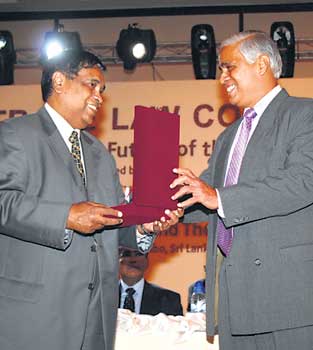
CJ slams travel advisories
Chief Justice Sarath N. Silva earlier this week slammed countries issuing negative travel advisories on Sri Lanka saying it was “horrible and inhumane and doesn’t lend any credence to the meaning of free trade.” Speaking at a global trade meeting in Colombo, he said the travel advisories issued by countries were in reaction to incidents that happened in 2006 in Sri Lanka in places such as Galle and Hikkaduwa where attacks were directed at military targets. “Tourists have never been victims of any terrorist attacks but interested lobbies have downplayed this fact and made a bad situation worse. The last tourist season hurt hotels and employees alike, Silva said. He was speaking on issues relating to the Doha Development Agenda which was chosen as the primary focus of the International Trade Law Conference 2007 held in Colombo. It was organized by the Sri Lanka Law College in conjunction with the Department of Commerce and the WTO in an attempt at revitalize the stalled negotiations and to facilitate an extensive discussion on crucial issues that have arise in the course of the Doha Development Agenda negotiations Members of the World Trade Organization (WTO), in particular the developing countries, are looking to this round of negotiations to understand the meaningful gains from the multilateral trading system. The Doha Ministerial Declaration was adopted on 14 November 2001 and called for placing the needs and interests of developing nations at the heart of the Work Program adopted in the declaration. Despite negotiations having been stalled, many still believe an agreement between nations can come to fruition. Success in the Doha Development agenda entails taking steps to correct and prevent restrictions and distortions such as domestic and export subsidies in world agricultural markets, reducing or eliminating tariffs and non-tariff barriers, in particular on products of export interest to developing countries. The agenda could also result in developing trade in services with a view to promoting the economic growth of all trading partners. Developing the least developed countries will be of critical significance if all people of the world are to benefit from increased opportunities and welfare gains that the multilateral trading system seeks to generate. Silva said a globally secure market for goods and services was needed. “A level playing field might not be possible when the players themselves are not equal and preferential treatment is tied up in politics.A Multilateral trading system should serve the economic needs of the people,” he said. Furthermore, grants to countries should not be withheld on the performance of the government but should be given based on the needs of the people. “Governments come and go but the people are the ones who will continue to suffer,” the Chief Justice said. He said there were always restrictions on trade. In the early 20th century, a lot of discriminatory trade systems emerged but countries rebelled. The General Agreement on Trade and Tariffs (GATT) was created after World War II and Sri Lanka or Ceylon as it was called back then, was one of the 23 original members of GATT. It paved the way for the Uruguay Round which has now led to the Doha Round, in hopes of addressing the concerns and points of contention which arose from 1986 to 1994. Minister of Tourism, Milinda Moragoda speaking at the inaugural ceremony of the conference said the polarizing situations many developing countries such as Sri Lanka face should not be used an excuse to stay away from reforms and implementing changes. Sri Lanka must compete and make a difference. Moragoda said despite the fact that some rules are fixed in favour of the stronger nations, developing countries must still be competitive and seek solutions, not excuses. He also said it was imperative to take into consideration the human dimension when it comes to developing trade and understand Sri Lanka's roots and culture in the context of a multilateral trading system. Tony Anghie, a Professor of Law at the University of Utah in the United States and a scholar of public international law speaking on trade and developing countries said, the WTO's dispute resolution process was most beneficial to countries that had experts who were adept at furthering their argument. “This is not case for developing countries where there is a lack of knowledgeable and informed experts in international trade law,” he said. Anghie also said the WTO has had to endure a lot of criticism on how it deals with social issues which has remained an ongoing complication. The widely held perception by the general public is that the WTO is impervious to human rights and other issues such as the protection of the environment. In Sri Lanka, there is the problem of comparative advantage. To a certain extent, Anghie said comparative advantage is dictated by government policy and natural factors but it is also a product of the history of colonialism which created a set of hierarchies. |
|
||
| || Front
Page | News
| Editorial
| Columns
| Sports
| Plus
| Financial
Times | International
| Mirror
| TV
Times | Funday Times|| |
| |
Copyright
2007 Wijeya
Newspapers Ltd.Colombo. Sri Lanka. |
